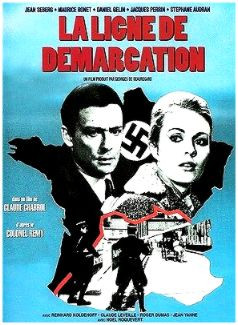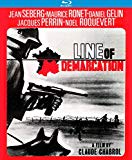| Reviews & Columns |
|
Reviews DVD TV on DVD Blu-ray 4K UHD International DVDs In Theaters Reviews by Studio Video Games Features Collector Series DVDs Easter Egg Database Interviews DVD Talk Radio Feature Articles Columns Anime Talk DVD Savant Horror DVDs The M.O.D. Squad Art House HD Talk Silent DVD
|
DVD Talk Forum |
|
|
| Resources |
|
DVD Price Search Customer Service #'s RCE Info Links |
|
Columns
|
|
|
Line of Demarcation
Not widely understood by Americans is that after the fall of France in May 1940, the Armistice initially resulted in a divided country, its northern and western territories (including Paris) administered by the German Army, with a "Free Zone" to the south administered by the (Vichy) French. Though the Free Zone was heavily dependent upon the German-occupied north, daily life was comparatively less stressful, while those fighting the Nazis could more freely move about and carry on their anti-German activities. The Demarcation became moot when Germans crossed the Line two-and-a-half years later and all of France fell under the same occupation authority.
In the movie, the river Loue and a single, guarded bridge separates the German-occupied side (where the story is set) from the relative freedom on the other side. Morally defeated and physically wounded French officer Pierre (Maurice Ronet), the Comte de Damville, crosses over into the village to return to his American-born wife, Mary (Seberg), the Comtesse, who against regulations secretly listens to BBC broadcasts on the radio and actively supports the resistance movement. Their château occupied by German Maj. Von Pritsch (Reinhard Kolldehoff), the couple has been moved into more modest quarters. Mary is disheartened to find Pierre has given up all hope of an eventual Allied victory.
Other characters are introduced. Michel (Jacques Perrin, The Young Girls of Rochefort, Cinema Paradiso) and French-speaking English Capt. Duncan Pregrave (Claude Léveillée) parachute into the village to set up a secret radio network for the Résistance, with the help of sympathetic local doctor, Jacques Lafaye (Daniel Gélin, the murdered spy in The Man Who Knew Too Much). Later, when Michel is injured, local teacher Tricot (Jean Yanne) hides him in the attic of his school.
Others, however, are less heroic. Insurance salesman Loiseau (René Havard), his business suffering, agrees to work as von Pritsch's interpreter, but finds himself ostracized by the rest of the village; most suspect him of spying, which the Gestapo eventually force him to do or forfeit his life. A ferryman (Roger Dumas) with a large family to support charges Jewish refugees a fortune to smuggle them across the Line but he abandons them in the forest in the middle of the night. The next morning the captured family, including a baby and elderly grandparents, are marched through the town, the villagers helpless to do anything.
When Loiseau unsubtly begins asking one-legged World War I veteran and die-hard socialist Menetru (Noël Roquevert) questions about the missing Michel, the old man threatens to beat him with his cane. When Loiseau visits the local barber (Serge Bento), who notices Loiseau is in no need of a trim, he's cleverly circumspect in his answers. Both scenes are tensely, intelligently played.
Except for some incongruous hairstyles and makeup on the women, Line of Demarcation plays harrowingly authentic, almost like a documentary. It observes fascinating, often tiny details of these strained relationships. The villagers needle their occupiers by correcting the Germans' French vocabulary and grammar, or if they're around soldiers who can't speak French at all, openly mock them. Cultured von Pritsch tries cozying up to the count and countess, possibly out of genuine sympathy and loneliness, but they won't have it.
Here, trust is a luxury no one can afford. When Mary secretly meets Capt. Duncan and Michel for the first time, she asks the Englishman trick questions about his life back home, trying to trip him up should he turn out to be a German spy. When Tricot needs help from the Catholic priest (Pierre Gualdi), he can't be sure who's side he's on. A charming scene with the Protestant Tricot whispering to the priest at Confession finds that both are on the side of the Résistance. Tricot is delighted but simultaneously embarrassed having to masquerade as a Catholic in order to find out.
Wonderful little moments like these are balanced by several highly suspenseful sequences, including a plot twist that had this reviewer genuinely gob-smacked. In contrast to the heroics of René Clément's Is Paris Burning?, released that same year, in Line of Demarcation the resistance supporters and collaborators, if not the opportunists and Gestapo, all suffer from the occupation, all pay a high price no matter their actions (or inaction). The wartime history of this little village is tragic for all, in big and little ways.
Video & Audio
Kino's Blu-ray of Line of Demarcation, licensed from Studio Canal and in black-and-white and 1.66:1 widescreen, looks pristine in this new 4K restoration, essentially flawless with remarkable blacks and excellent contrast. The DTS-HD Master Audio (French mono only) is supported by optional English subtitles that occasionally offer slightly-odd translations of the dialogue, but this is a very minor complaint. Region "A" encoded.
Extra Features
Supplements are limited to a new audio commentary track by critic Samm Deighan, more a reading of the film but generally good.
Parting Thoughts
I was only vaguely aware of this film but was duly impressed both by the film and the superb video transfer. A DVD Talk Collectors Series title.
Stuart Galbraith IV is the Kyoto-based film historian currently restoring a 200-year-old Japanese farmhouse.
|
| Popular Reviews |
| Sponsored Links |
|
|
| Sponsored Links |
|
|
| Release List | Reviews | Shop | Newsletter | Forum | DVD Giveaways | Blu-Ray | Advertise |
|
Copyright 2024 DVDTalk.com All Rights Reserved. Legal Info, Privacy Policy, Terms of Use,
Manage Preferences,
Your Privacy Choices | |||||||















